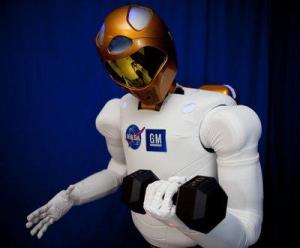Dec 30 2010
NASA has developed the first human-like robot, which eventually will be flying in space. NASA is expecting to launch the Robonaut 2 on February 3, 2011, aboard the Discovery space shuttle. The robot will be the first humanoid to fly in space.
 Robonaut 2 surpasses previous dexterous humanoid robots in strength, yet it is safe enough to work side-by-side with humans. It is able to lift, not just hold, this 20-pound weight (about four times heavier than what other dexterous robots can handle) both near and away from its body.
Robonaut 2 surpasses previous dexterous humanoid robots in strength, yet it is safe enough to work side-by-side with humans. It is able to lift, not just hold, this 20-pound weight (about four times heavier than what other dexterous robots can handle) both near and away from its body.
The robot was built using the technology developed at NASA’s Ames Research Center located in Mountain View. It was jointly built by NASA and General Motors. The humanoid-like robot features a head, human-like shoulders and chest, and two arms. The finger, wrists and thumbs of the Robonaut 2 has enough dexterity to hold a pen and write as well as dial an iPhone. The robot can write the word ‘hello’.
A senior robotics researcher at Ames, Vytas SunSpiral commented that the Robonaut 2 has been built to bring the future of robots, where they will be working in public and people’s house. NASA has planned to use the robot for risky tasks such as spacewalks. The agency has also planned to use the robot for mundane jobs like swabbing the space station’s internal surfaces to avoid the build up of bacteria.
General Motors is planning to build and use an advanced version of Robonaut 2 or the technology’s component pieces for its assembly lines and inside the cars.